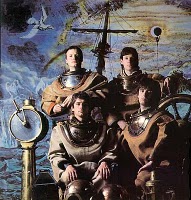 By 1980’s “Black Sea” XTC were fully into their stride, the previous years exceptional “Drums And Wires” remains an early high water mark yet “Black Sea” sees them expanding their sound further, moving away from the angular, sparky new wave of that album and towards a tougher, rockier sound, as such it’s arguably their most accessible of all their early albums. A 60’s feel is beginning to rear it’s head in a lot of their work, take for instance “Respectable Street” and “Towers Of London,” the former has strong echoes of mid 60’s Kinks whilst the latter is pure “Rubber Soul” era Beatles, both given a punkish twist, “No Language In Our Lungs” also has a strong Beatles influence but still manages to sound typically XTC. Where “Drums And Wires” was rough around the edges “Black Sea” is a lot more focused and less artsy sounding, still this is XTC so fans of their artsy leanings can always revel in “Travels In Nihilon’s” apocalyptic soundscape or “Living Through Another Cuba’s” dub infused paranoia but overall Black Sea is a lot more polished and poppy than anything the band had recorded since their spiky, charming debut. “Generals And Majors,” “Love At First Sight,” “Rocket From A Bottle,” “Paper And Iron” and “Burning With Optimism’s Flames” would all have made great singles, strange then that they chose to release arguably the album’s weakest track, the XTC by numbers of “Sgt Rock,” still it’s one misstep on an otherwise blemish free album, I prefer the jittery, nervous “Drums And Wires” ever so slightly but that does not diminish “Black Sea’s” tough majesty. Yet another classic from England’s most underrated band. –Derek
By 1980’s “Black Sea” XTC were fully into their stride, the previous years exceptional “Drums And Wires” remains an early high water mark yet “Black Sea” sees them expanding their sound further, moving away from the angular, sparky new wave of that album and towards a tougher, rockier sound, as such it’s arguably their most accessible of all their early albums. A 60’s feel is beginning to rear it’s head in a lot of their work, take for instance “Respectable Street” and “Towers Of London,” the former has strong echoes of mid 60’s Kinks whilst the latter is pure “Rubber Soul” era Beatles, both given a punkish twist, “No Language In Our Lungs” also has a strong Beatles influence but still manages to sound typically XTC. Where “Drums And Wires” was rough around the edges “Black Sea” is a lot more focused and less artsy sounding, still this is XTC so fans of their artsy leanings can always revel in “Travels In Nihilon’s” apocalyptic soundscape or “Living Through Another Cuba’s” dub infused paranoia but overall Black Sea is a lot more polished and poppy than anything the band had recorded since their spiky, charming debut. “Generals And Majors,” “Love At First Sight,” “Rocket From A Bottle,” “Paper And Iron” and “Burning With Optimism’s Flames” would all have made great singles, strange then that they chose to release arguably the album’s weakest track, the XTC by numbers of “Sgt Rock,” still it’s one misstep on an otherwise blemish free album, I prefer the jittery, nervous “Drums And Wires” ever so slightly but that does not diminish “Black Sea’s” tough majesty. Yet another classic from England’s most underrated band. –Derek
Punk and New Wave
This Heat “Deceit” (1981)
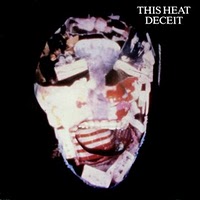 Stimulus and response. Art rock on the far side of punk, this is as nervously exposed and at least as aggressive as the latter, while being as meticulously constructed and self-reflective as the former. The essential difference is in the aesthetic commitment. They rehearsed and composed in a meat locker, and being committed to their conceptions, they recorded their records there too. The paradox of making such vital music in such a moribund space comes to a strangely logical fulfillment by being this album’s greatest sonic virtue: its shock and awe dynamics forego the simple attack of a studio-made record which would appeal to more ears and be both more prog and more punk. This is rock as art and thus no audience. Too bad we choose categories over impulses. On the other hand, they’re now gaining ground, and, unfortunately, wider influence. Commodification is coming. Enjoy the impact of this record while it lasts.
Stimulus and response. Art rock on the far side of punk, this is as nervously exposed and at least as aggressive as the latter, while being as meticulously constructed and self-reflective as the former. The essential difference is in the aesthetic commitment. They rehearsed and composed in a meat locker, and being committed to their conceptions, they recorded their records there too. The paradox of making such vital music in such a moribund space comes to a strangely logical fulfillment by being this album’s greatest sonic virtue: its shock and awe dynamics forego the simple attack of a studio-made record which would appeal to more ears and be both more prog and more punk. This is rock as art and thus no audience. Too bad we choose categories over impulses. On the other hand, they’re now gaining ground, and, unfortunately, wider influence. Commodification is coming. Enjoy the impact of this record while it lasts.
History repeats itself. But good music never does. This is the best-kept secret in rock music. So essential, this review ain’t worth the bytes it’s made of. Just get it already. (No, don’t!) –Will
The Records “The Records” (1979)
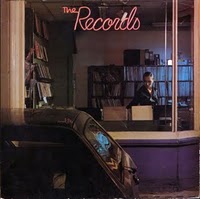 Sure, their flawless, jet-setting single “Starry Eyes” is reason enough to pick up The Records’ debut, but the album as a whole is stuffed with more sugary goodness than your average box of Frosted Flakes. The first side is jam-packed with the restless “All Messed Up and Ready to Go,” adolescent buzz of “Teenarama,” minor key mood piece “Girls That Don’t Exist,” and choice deep cut in the lingering ballad “Up All Night,” while the remainder is highlighted by the punchy rock of “Girl,” nervous “Insomnia,” and jukebox hero tale, “Another Star.” With the requisite vocal harmonies and ringing guitars filled out with the occasional organ or synthesizer, The Records is steadfast in it’s delivery of classic power pop confection. –Ben
Sure, their flawless, jet-setting single “Starry Eyes” is reason enough to pick up The Records’ debut, but the album as a whole is stuffed with more sugary goodness than your average box of Frosted Flakes. The first side is jam-packed with the restless “All Messed Up and Ready to Go,” adolescent buzz of “Teenarama,” minor key mood piece “Girls That Don’t Exist,” and choice deep cut in the lingering ballad “Up All Night,” while the remainder is highlighted by the punchy rock of “Girl,” nervous “Insomnia,” and jukebox hero tale, “Another Star.” With the requisite vocal harmonies and ringing guitars filled out with the occasional organ or synthesizer, The Records is steadfast in it’s delivery of classic power pop confection. –Ben
The Fall “Live at the Witch Trials” (1979)
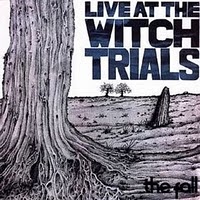 They are the Fall. He is the Fall. I’m awfully glad someone is, because, pound for pound, album for album, song for song, no one would make such consistently exciting music between 1977 and about 1987. Their debut LP is just about as extraordinary as any of their other prime-period albums, as a young Mark E Smith rants over a busily neurotic minimalism that here sounds a lot like Public Image Ltd. but with more Can than dub in the mix. They also have more studio polish here than they would for several albums, even if it is an ultra-cheap studio sound with a slightly cheesy “punchy” drum sound and a rather drab mix that’s oddly glossy in comparison with, say, Grotesque or Hex Enduction Hour. And even if the infamous Fall sonic/conceptual vocabulary is only in its infancy on this one, this is light years ahead of its peers for morbidly funny, scathing misanthropic vitriol and irresistible two-note hooks. I shouldn’t say that. The Fall have always been peerless. Not a weak track on here; threatening, hilarious, creepy, that is the Fall. If you don’t like ’em, you deserve it. –Will
They are the Fall. He is the Fall. I’m awfully glad someone is, because, pound for pound, album for album, song for song, no one would make such consistently exciting music between 1977 and about 1987. Their debut LP is just about as extraordinary as any of their other prime-period albums, as a young Mark E Smith rants over a busily neurotic minimalism that here sounds a lot like Public Image Ltd. but with more Can than dub in the mix. They also have more studio polish here than they would for several albums, even if it is an ultra-cheap studio sound with a slightly cheesy “punchy” drum sound and a rather drab mix that’s oddly glossy in comparison with, say, Grotesque or Hex Enduction Hour. And even if the infamous Fall sonic/conceptual vocabulary is only in its infancy on this one, this is light years ahead of its peers for morbidly funny, scathing misanthropic vitriol and irresistible two-note hooks. I shouldn’t say that. The Fall have always been peerless. Not a weak track on here; threatening, hilarious, creepy, that is the Fall. If you don’t like ’em, you deserve it. –Will
X “Under The Big Black Sun” (1982)
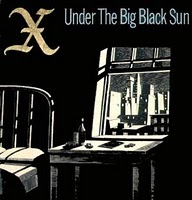 A record that sums up Americana as well as any other. “Under The Big Black Sun” is proof that X was as good of a country band as they were a punk band. Rockin’, rollicking, dissonant and dizzying, this record is a forty-five minute bender. Bookended by “The Hungry Wolf” (an superblast of syncopated yell along) and “The Have Nots” (possibly the best drinking song ever), this is the soundtrack to an unencumbered night out. –Cameron
A record that sums up Americana as well as any other. “Under The Big Black Sun” is proof that X was as good of a country band as they were a punk band. Rockin’, rollicking, dissonant and dizzying, this record is a forty-five minute bender. Bookended by “The Hungry Wolf” (an superblast of syncopated yell along) and “The Have Nots” (possibly the best drinking song ever), this is the soundtrack to an unencumbered night out. –Cameron
The B-52’s “The B-52’s” (1979)
 The Ultimate Party Album! An abundance of hooks fill every track, but it wouldn’t be that good if it weren’t for the vocals. Spoken, sung, screeched, wobbled, it’s all marvelous. And the yokoisms! And the lyrics! And the cover! New wave new wave new wave! –Tuukka
The Ultimate Party Album! An abundance of hooks fill every track, but it wouldn’t be that good if it weren’t for the vocals. Spoken, sung, screeched, wobbled, it’s all marvelous. And the yokoisms! And the lyrics! And the cover! New wave new wave new wave! –Tuukka
New Order “Low-Life” (1985)
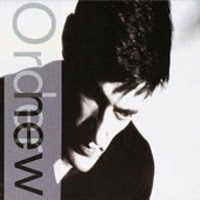 One of New Order’s great subtext is the notion that these band members don’t like each other. Low-Life is a typical New Order record, a 50/50 mix of guitar rock and mechanical dance tracks built around synths and table-top boxes, but it stands out to me for excellent songwriting that hints at genuine emotion restrained by an unwillingness to emote in front of those people. Lyrically uncommitted and passive, this is the sound of a band at a creative high with A+ material, trying to keep the sneer hidden behind a stiff upper lip. High points for me are “This Time Of Night” and “Sub-Culture” (the latter of which was a dance club hit) both of which juxtapose the deadpan with cinematic, sinister hooks. –Cameron
One of New Order’s great subtext is the notion that these band members don’t like each other. Low-Life is a typical New Order record, a 50/50 mix of guitar rock and mechanical dance tracks built around synths and table-top boxes, but it stands out to me for excellent songwriting that hints at genuine emotion restrained by an unwillingness to emote in front of those people. Lyrically uncommitted and passive, this is the sound of a band at a creative high with A+ material, trying to keep the sneer hidden behind a stiff upper lip. High points for me are “This Time Of Night” and “Sub-Culture” (the latter of which was a dance club hit) both of which juxtapose the deadpan with cinematic, sinister hooks. –Cameron


